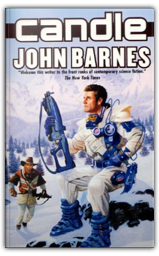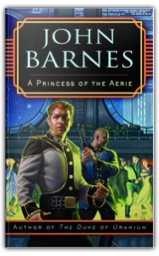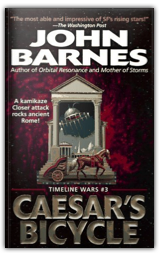 Caesar's Bicycle
John Barnes
Caesar's Bicycle
John Barnes
Mark Strang is asked to travel far back in time to the period of Caesar and the great Roman Triumvirate, in order to investigate the disappearance of a fellow time agent. What he discovers is that Caesar has been subverted by a Closer representative and that the Triumvirate has been undermined with civil war, mutual destruction, and the rewriting of history looming in the near future. 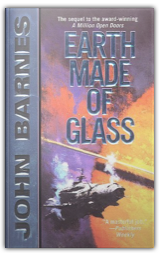 Earth Made of Glass
John Barnes
Earth Made of Glass
John Barnes
In a sequel to A Million Open Doors, John Barnes writes another novel in the universe of the Thousand Cultures. Humanity dwells in colonies (some natural and some artificial) spread over hundreds of planets that lost touch with each other for over a thousand years. Due to the invention of the springer, an instantaneous teleportation device, the worlds are communicating again. But after centuries of isolation, reunification results in intense cultural and economic stress. 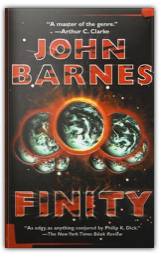 Finity
John Barnes
Finity
John Barnes
A skilled SF author who's been publishing novels since 1987, John Barnes seems underrated in the field—perhaps because he is so versatile. His 1990s work included the disaster blockbuster Mother of Storms, the doom-ridden political tragedy Earth Made of Glass, and—the only whimsical fantasy to rival William Goldman's The Princess Bride—Barnes—Barnes's One for Morning Glory. 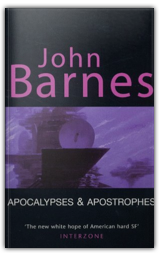 Apocalypses & Apostrophes
John Barnes
Apocalypses & Apostrophes
John Barnes
John Barnes writes hard SF with a heart; his speculations are always grounded in working things out from first principles, but he remembers to think also about how his imaginary situations might feel. "Gentleman Pervert, Out on a Spree", for example, starts with some speculation about tagging, and the speed with which an information age can make a marginal life get worse—Ken is photographed kerb-crawling and is then divorced and sacked before he even gets home. 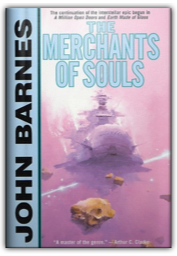 The Merchants of Souls
John Barnes
The Merchants of Souls
John Barnes
In The Merchants of Souls, a new movement on Earth seeks to use the recorded personalities of the dead as their helpless virtual reality playthings. To the worlds of the interstellar Thousand Cultures, where the reborn are accepted as normal citizens, its a monstrous crime and reinforces their distaste for Earth. If Earth cannot be stopped from ratifying its plans, the entire structure of galactic human civilization will collapse. 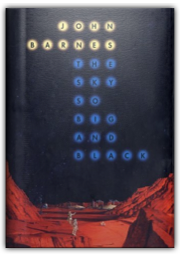 The Sky So Big and Black
John Barnes
The Sky So Big and Black
John Barnes
"They don't make 'em like that any more!" say fans of the classic juvenile SF novels, Alexei Panshin's Rite of Passage (1968) and the run of Robert A. Heinlein novels that begins with Rocket Ship Galileo (1947) and ends with Podkayne of Mars (1963). Except—John Barnes has made one like that: The Sky So Big and Black. The book's brilliant teenage protagonist, hard science, brisk pace, didactic moments, and strong characterization make it clear that Barnes is working consciously in the tradition of Panshin and Heinlein (especially Heinlein's Red Planet [1949] and Podkayne of Mars). Like his models, Barnes does a superb job. The Sky So Big and Black is a classic. Read it, and give it to any smart, perhaps-outcast young reader whom you want to infect with the science fiction meme. 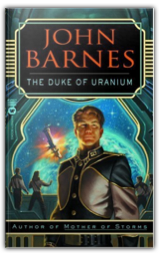 The Duke of Uranium
John Barnes
The Duke of Uranium
John Barnes
Fifteen hundred years in the future: after seven wars with the alien Rubahy, after settlement upon settlement and resettlement of every piece of dirt available, after every imaginable religious and political upheaval. Mars has been terraformed for a thousand years, glaciers cover Europe, central Africa is Earth's breadbasket, some space freighters have twentieth-generation crews. More people live in space than on Earth. And no one has found a way around the light-speed limit; the human race is still confined to one solar system, though now we share it with the Rubahy. 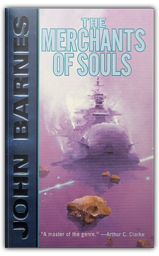 The Merchants of Souls
John Barnes
The Merchants of Souls
John Barnes
The sequel to A Million Open Doors and Earth Made of Glass 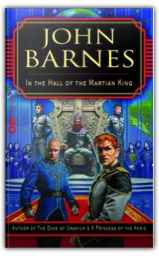 In the Hall of the Martian King
John Barnes
In the Hall of the Martian King
John Barnes
A Martian monarch has taken possession of a priceless relic: the lifelog diary of the mysterious messiah who founded the Wager, the religion that forms the basis of all interstellar society. The Hive Intel conglomerate wants the lifelog and hires Jak to get it. It's a simple job, until other spies-including Ambassador Dujuv, Uncle Sib, and Jak's evil ex-girlfriend-arrive on Mars and turn the assignment into a wild ride of mind control, murder, and looming interplanetary war. For the lifelog contains a devastating secret that can overturn the status quo of whole worlds-a secret that Hive Intel will suppress at all costs. In the past, Jak has completed missions by betraying his friends. Now in order to succeed, Jak Jinnaka must betray the entire human race... 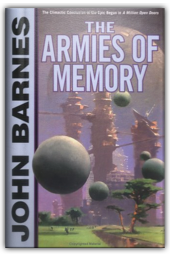 The Armies of Memory
John Barnes
The Armies of Memory
John Barnes
Giraut Leones, special agent for the Thousand Cultures shadowy Office of Special Plans, is turning fifty—and someone is trying to kill him. |
 Made with Delicious Library
Made with Delicious Library
London, State zipflap congrotus delicious library Scott, Mike



